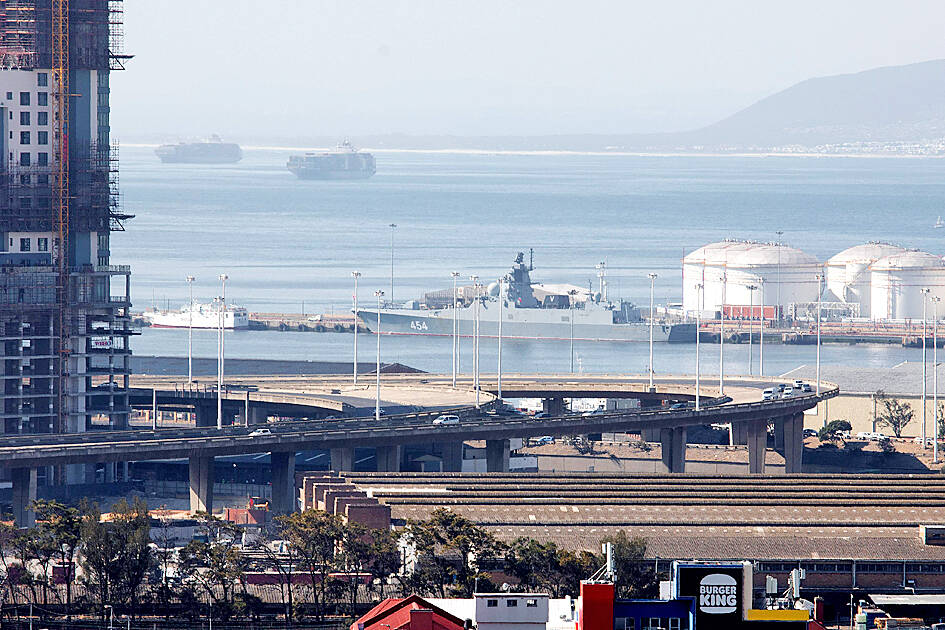South Africa was yesterday due to embark on a 10-day routine joint military exercise with Russia and China along its eastern coast amid criticism at home and abroad.
The drills — just days before Moscow marks one year since its invasion of Ukraine — have been slammed as tantamount to endorsing the Kremlin’s onslaught on its neighbor.
A Russian military frigate was docked in Cape Town’s harbor earlier this week for what a Russian diplomat called “refueling” on its way to Durban.

Photo: AFP
The exercises, dubbed “Mosi,” meaning “smoke” in Tswana, are scheduled to take place until Feb. 27 off the port cities of Durban and Richards Bay. They are the second in a series of routine drills that Pretoria hosts with foreign nations, including Russia.
More than 350 members of South Africa’s armed forces are to take part in the exercises “with an aim of sharing operational skills and knowledge” with Russia and China, the South African military said last month.
South Africa has refused to condemn the invasion of Ukraine, which has largely isolated Moscow on the international stage, saying it wants to stay neutral and prefers dialogue to end the war.
However, the country has come under attack for hosting the joint drills.
“The event is being held on the anniversary of the invasion of Ukraine, so it’s clearly a propaganda event aimed at bolstering support for the invasion,” said Tim Cohen, an editor at South Africa’s Daily Maverick newspaper.
Pretoria’s “pretense of being in favor of a negotiated solution to the Ukraine crisis dissolves with this exercise,” he added.
The largest opposition party, the Democratic Alliance, has been highly critical of the exercises, saying they “make South Africa complicit in these war crimes.”
“We are drawn into the propaganda show of Russia,” said Kobus Marais, a South African lawmaker representing the party.
In the US, White House press secretary Karine Jean-Pierre last month said that “the United States has concerns about any country ... exercising with Russia, while Russia wages a brutal war against Ukraine.”
A spokesman of the Russian consulate in Cape Town earlier this week said that “South Africa, as any other countries, [can] conduct military exercises with friends worldwide.”
A South African military source said “the main exercise” would take place on Wednesday.

Taiwan is projected to lose a working-age population of about 6.67 million people in two waves of retirement in the coming years, as the nation confronts accelerating demographic decline and a shortage of younger workers to take their place, the Ministry of the Interior said. Taiwan experienced its largest baby boom between 1958 and 1966, when the population grew by 3.78 million, followed by a second surge of 2.89 million between 1976 and 1982, ministry data showed. In 2023, the first of those baby boom generations — those born in the late 1950s and early 1960s — began to enter retirement, triggering

ECONOMIC BOOST: Should the more than 23 million people eligible for the NT$10,000 handouts spend them the same way as in 2023, GDP could rise 0.5 percent, an official said Universal cash handouts of NT$10,000 (US$330) are to be disbursed late next month at the earliest — including to permanent residents and foreign residents married to Taiwanese — pending legislative approval, the Ministry of Finance said yesterday. The Executive Yuan yesterday approved the Special Act for Strengthening Economic, Social and National Security Resilience in Response to International Circumstances (因應國際情勢強化經濟社會及民生國安韌性特別條例). The NT$550 billion special budget includes NT$236 billion for the cash handouts, plus an additional NT$20 billion set aside as reserve funds, expected to be used to support industries. Handouts might begin one month after the bill is promulgated and would be completed within

NO CHANGE: The TRA makes clear that the US does not consider the status of Taiwan to have been determined by WWII-era documents, a former AIT deputy director said The American Institute in Taiwan’s (AIT) comments that World War-II era documents do not determine Taiwan’s political status accurately conveyed the US’ stance, the US Department of State said. An AIT spokesperson on Saturday said that a Chinese official mischaracterized World War II-era documents as stating that Taiwan was ceded to the China. The remarks from the US’ de facto embassy in Taiwan drew criticism from the Ma Ying-jeou Foundation, whose director said the comments put Taiwan in danger. The Chinese-language United Daily News yesterday reported that a US State Department spokesperson confirmed the AIT’s position. They added that the US would continue to

IMPORTANT BACKER: China seeks to expel US influence from the Indo-Pacific region and supplant Washington as the global leader, MAC Minister Chiu Chui-cheng said China is preparing for war to seize Taiwan, Mainland Affairs Council (MAC) Minister Chiu Chui-cheng (邱垂正) said in Washington on Friday, warning that Taiwan’s fall would trigger a regional “domino effect” endangering US security. In a speech titled “Maintaining the Peaceful and Stable Status Quo Across the Taiwan Strait is in Line with the Shared Interests of Taiwan and the United States,” Chiu said Taiwan’s strategic importance is “closely tied” to US interests. Geopolitically, Taiwan sits in a “core position” in the first island chain — an arc stretching from Japan, through Taiwan and the Philippines, to Borneo, which is shared by